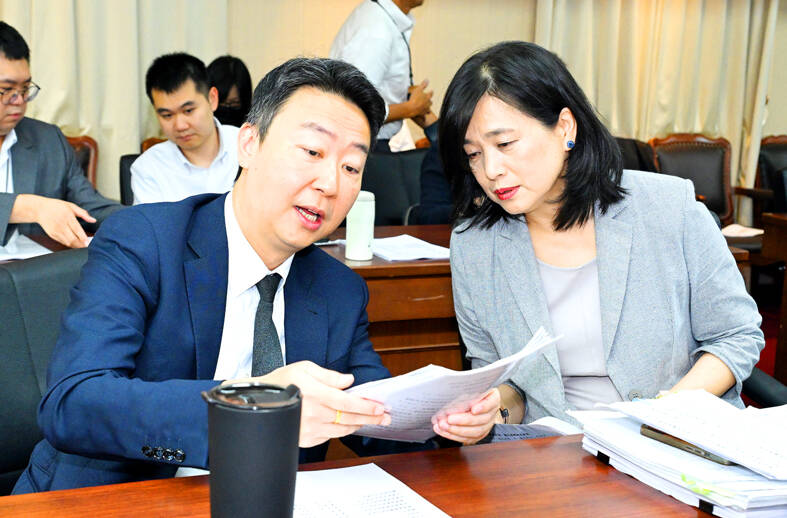A Tourism Administration official yesterday said that the agency is confident that the number of international visitors would reach 9 million, but the estimate still falls short of this year’s 10 million target.
Administration Director-General Chen Yu-hsiu (陳玉秀) made the statement during a briefing at a meeting of the legislature’s Transportation Committee, her first since assuming the post last month.
Asked by lawmakers if she was confident that the agency would reach the 10 million international visitors goal for this year, she said: “We should have no problem having 9 million.”

Photo: Liao Chen-huei, Taipei Times
Taiwan People’s Party (TPP) Legislator Lin Kuo-cheng (林國成) and Democratic Progressive Party (DPP) Legislator Tsai Chi-chang (蔡其昌) suggested that the administration use “Taiwan Sensibility” (台灣感性), a term that recently went viral on South Korean social media, using Taiwan’s nostalgic and everyday charm to appeal to South Korean visitors.
“We have tried so hard to tell foreigners what makes Taiwan different from other Asian countries, and now you have the answer falling right into your lap,” Tsai said.
Taiwan has seen a relatively slow return of international visitors after COVID-19 restrictions were lifted in October 2022.
In 2019, the nation recorded 11.86 million international visitors. The number of international visitors in 2023 and last year were 6.48 million and 7.85 million respectively.
As of last month, the nation welcomed 4.19 million international visitors, a 10 percent increase compared with the same period last year.
Meanwhile, the Tourism Administration reported a significant growth in domestic travel last year.
Domestic travel reached 222 million trips, surpassing the 206 million trips in 2023 and the 169 trips in 2019, it said, adding that the increase in day trips contributed to the growth.
Last year, 77 percent of domestic travelers were day travelers, compared with only 71 percent in 2023 and 66 percent in 2019, agency statistics showed.
Chen said that as the trend could hurt hotels and other accommodations, the agency has introduced theme tours to boost hotel occupancy rates.
In other news, Minister of Transportation and Communications Chen Shih-kai (陳世凱) said that the ministry does not allocate any budget for airlines to upgrade military personnel to business class.
Any benefits offered by retailers during Armed Forces Day are voluntary, and given out of their respect and appreciation for the sacrifices made by military personnel, the minister added.
President William Lai (賴清德) earlier this month proposed to allow service members to access priority boarding and suggested that they be upgraded to business class.
While priority boarding has become available to military personnel since July 1, the Ministry of Transportation and Communications is still evaluating the feasibility of the second proposal.
Lawmakers also questioned the president’s proposals at the committee meeting yesterday, asking whether the same benefits should be available to police and firefighters,
Their sacrifices are no less important than that of military personnel, they said.
Lawmakers also asked whether the policy should apply to families of service members when they travel together.
The minister said that airlines use identical standards to treat service members.
“Seats in the business class should first be available to passengers who purchase them or those that are in airlines’ mileage programs. Airlines could consider inviting service members to sit in business class if there are unoccupied seats remaining,” he said, adding that the ministry did not have the budget to fund such upgrades.

A small number of Taiwanese this year lost their citizenship rights after traveling in China and obtaining a one-time Chinese passport to cross the border into Russia, a source said today. The people signed up through Chinese travel agencies for tours of neighboring Russia with companies claiming they could obtain Russian visas and fast-track border clearance, the source said on condition of anonymity. The travelers were actually issued one-time-use Chinese passports, they said. Taiwanese are prohibited from holding a Chinese passport or household registration. If found to have a Chinese ID, they may lose their resident status under Article 9-1

Taiwanese were praised for their composure after a video filmed by Taiwanese tourists capturing the moment a magnitude 7.5 earthquake struck Japan’s Aomori Prefecture went viral on social media. The video shows a hotel room shaking violently amid Monday’s quake, with objects falling to the ground. Two Taiwanese began filming with their mobile phones, while two others held the sides of a TV to prevent it from falling. When the shaking stopped, the pair calmly took down the TV and laid it flat on a tatami mat, the video shows. The video also captured the group talking about the safety of their companions bathing

A classified Pentagon-produced, multiyear assessment — the Overmatch brief — highlighted unreported Chinese capabilities to destroy US military assets and identified US supply chain choke points, painting a disturbing picture of waning US military might, a New York Times editorial published on Monday said. US Secretary of Defense Pete Hegseth’s comments in November last year that “we lose every time” in Pentagon-conducted war games pitting the US against China further highlighted the uncertainty about the US’ capability to intervene in the event of a Chinese invasion of Taiwan. “It shows the Pentagon’s overreliance on expensive, vulnerable weapons as adversaries field cheap, technologically

Starting on Jan. 1, YouBike riders must have insurance to use the service, and a six-month trial of NT$5 coupons under certain conditions would be implemented to balance bike shortages, a joint statement from transportation departments across Taipei, New Taipei City and Taoyuan announced yesterday. The rental bike system operator said that coupons would be offered to riders to rent bikes from full stations, for riders who take out an electric-assisted bike from a full station, and for riders who return a bike to an empty station. All riders with YouBike accounts are automatically eligible for the program, and each membership account